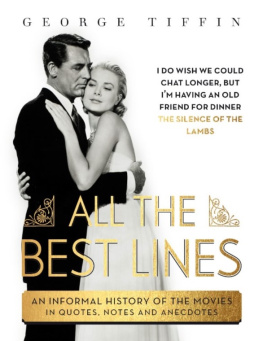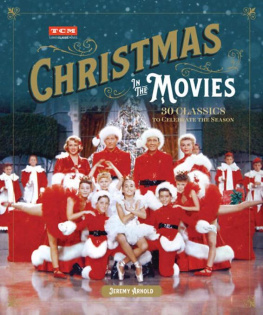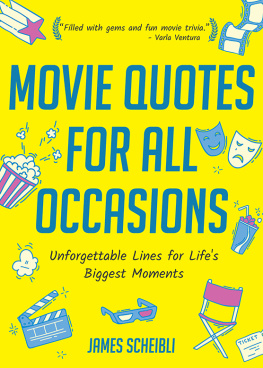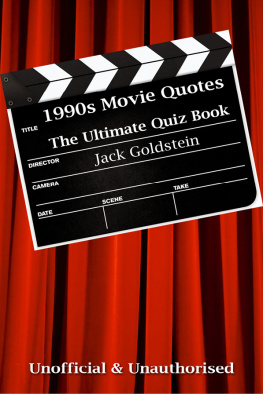


www.headofzeus.com
For my parents, who taught me
to look as well as to listen.
Frank Capra, whose winning streak as a director of warm-hearted comedies earned him six Oscars.
CONTENTS
Cinema: spectacle, stars and spotlights. And, somewhere in the distant background, the clatter of a typewriter. This book celebrates the shimmer of the silver screen but really pays tribute to the men and women who dreamed up its stories: the screenwriters.
Audiences dont know somebody sits down and writes a picture. They think the actors make it up as they go along.
Screenwriter Joe Gillis (William Holden)
Sunset Boulevard (1950)
A script has to make sense, and life doesnt.
Screenwriter Harry Dawes (Humphrey Bogart)
The Barefoot Contessa (1954)
In the beginning the early 1890s moving pictures were such a novelty that crowds would flock just to see footage of a train pulling into a station, a circus performer or a man sneezing. Before long, directors like D. W. Griffith and Sergei Eisenstein had found ways to shape silent scenes into epic narratives with masterpieces like The Birth of a Nation (1915) and Battleship Potemkin (1925). But as screen stories grew more sophisticated and engaging one crucial aspect was still absent: the voice.
In 1927 technology enabled feature-length presentations to include a synchronized soundtrack and actors were free to speak at last. Many directors resented this shift in power but producers and public alike embraced the change at once. A subtler shift made itself felt, too: scripts were no longer just structural blueprints but carefully constructed documents filled with description and dialogue that needed pace, sparkle and insight.
The film world was not short of literary talent, and many prestigious authors and journalists soon accepted commissions to write for the movies. But the public had grown used to their stars and no producer wanted to splash the face of a screenwriter across a billboard when he could entice his audience with Errol Flynn or Mae West. Even directors names remained largely absent from posters for the first half of the twentieth century, but the figures behind the scenes could at least take consolation in their pay cheques. Shortly after his arrival in Hollywood Herman J. Mankiewicz cabled playwright Ben Hecht: Will you accept $300 per week to work for Paramount? All expenses paid. $300 is peanuts. Millions are to be grabbed out here and your only competition is idiots. Dont let this get around. Though Mankiewicz and Hecht may be less well known than their novelist contemporaries Hemingway, Fitzgerald and Steinbeck they penned between them enduring classics such as Citizen Kane , Its a Wonderful World , The Pride of St Louis, Scarface and Notorious .
The power of a screenwriter to bring a story to life or to kill it remains controversial to this day. Alfred Hitchcock famously said to make a great film you need three things the script, the script and the script, while an old industry joke told of the ambitious starlet who was so desperate to break into movies that she seduced a screenwriter. Irving Thalberg, one of the most successful impresarios of Hollywoods golden age, was more astute, remarking that the most important person in the motion picture process is the writer, and we must do everything in our power to prevent them from ever realizing it.
When we see Al Pacino as Shylock in The Merchant of Venice we understand we are watching a man interpret Shakespeares words. When we buy tickets to any theatre production we know we are seeing the work of a particular writer: Strindbergs Miss Julie , Becketts Waiting for Godot . But the cinema is a different world. Who wrote On the Waterfront or Apocalypse Now ? Even while lines like I coulda been a contender or I love the smell of napalm in the morning are universally known, few could name their author.
In many cases, the question is complicated by the fact that films frequently have multiple contributors for story, for dialogue, for individual scenes or even in some cases to tailor lines for a specific actor. Attribution and remuneration are often contentious, leading to the suspicion that the business of screenwriting is perfunctory and competitive. Sitting before their typewriter, laptop or iPad no true writer feels this; as this book hopes to show, they want only to deliver something powerful and true which will captivate us after we have bought our ticket and taken our seat in the dark.
Writers have always had a difficult relationship with their paymasters and it remains true that producers are rarely depicted on screen in a flattering light:
Were only interested in one thing, Bart. Can you tell a story? Can you make us laugh? Can you make us cry? Can you make us want to break out in joyous song? Is that more than one thing? Okay!
Producer Jack Lipnick (Michael Lerner)
Barton Fink (1991)
I was just thinking what an interesting concept it is to eliminate the writer from the artistic process. If we could just get rid of these actors and directors, maybe weve got something here.
Producer Griffin Mill (Tim Robbins)
The Player (1992)
If these portrayals seem unfair we should remember the genuine remark by Joe Pasternak, one of MGMs staff during the 1950s: You call this a script? Give me a couple of $5,000-a-week writers and Ill write it myself. Many of Pasternaks contracted writers would doubtless have enjoyed watching him try or, failing that, to accept his cheque since $5,000 back then would be the equivalent of nearly $50,000 today.
While novelists and playwrights enjoy authorial independence and are revered for their unique voices, screenwriters have to satisfy many different masters: producers, directors and actors. To deliver a coherent story in the face of their conflicting demands can be frustrating, if not impossible. Joseph L. Mankiewicz, brother of Herman and author of All About Eve and Cleopatra , remarked ruefully that writers are the highest paid secretaries in the world. William Goldman, responsible for All the Presidents Men , Marathon Man and The Princess Bride , is more candid: Screenwriting is what feminists call shit-work; if its well done, its ignored. If its badly done, people call attention to it. True of many professions, perhaps, but at least Goldman has two Oscars to show that the best work is often rewarded.
If the names of screenwriters do not readily trip from our tongues, the lines they have written remain with us zingers, catchphrases, stirring speeches, whispers of endearment. Their words echo everywhere and they prove fitting tribute to their creators long after the credits have rolled.
This book contains five hundred excerpts of varying lengths as well as one-liners, poster quotes, opening scenes and familiar favourites to delight and enlighten. Essays throughout the text shed light on how the scripts were written, and on their journeys from page to celluloid. No matter who dreamed up the story or bought the rights to a bestseller, no matter what it cost or who was cast to play a role, somebody sat down to write it. All The Best Lines is about those men and women.
The films represented are grouped not by genre or title but by theme; a listing will be found on the contents page. Within each theme the running order is chronological; ideally this will allow a lively juxtaposition of style and author. The index will, of course, lead you straight to any particular film the book contains.
Next page







